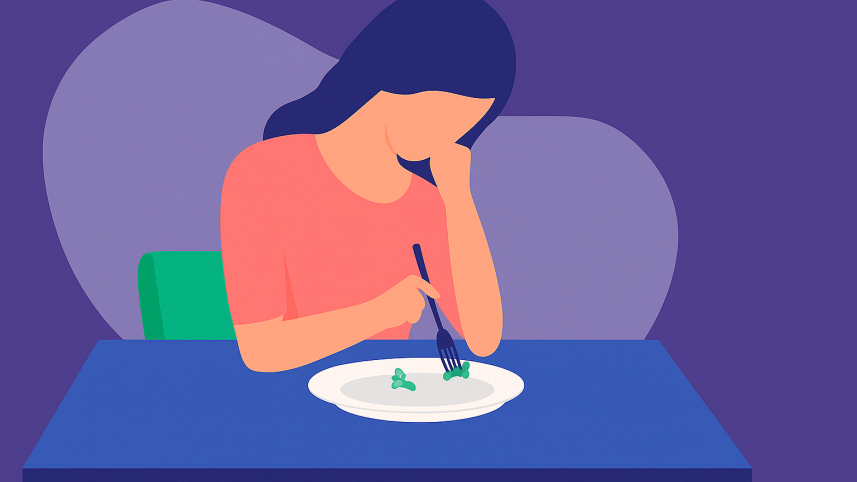Is social media fuelling teen eating disorders in Bangladesh?

Eating disorders are more than just issues with eating — they are serious mental health conditions that can affect children and teenagers physically, emotionally, and psychologically.
In a conversation with Dr Sanjay Chatterjee, Children's Physician at Super Specialized Hospital Ltd, Dhanmondi, Dhaka, it became clear that eating disorders in children are frequently misunderstood or overlooked. "Parents often think it's just a phase or fussiness," he explained, "but in many cases, these behaviours are rooted in something deeper."
Early Red Flags
Though full-fledged eating disorders are typically diagnosed in adolescence, Chatterjee emphasized that some conditions can surface much earlier. One of the most concerning is Pica, where a child repeatedly eats non-food items like wall paint, chalk or paper. "We've seen cases of Pica in children under two years old," he said. "It's often triggered by nutritional deficiencies — especially iron — or associated with developmental conditions like autism."
While correcting the deficiency can help, the underlying issue often needs psychological support. "It's not just about stopping the behaviour," he added. "We need to ask why the child is doing it in the first place."
Teenage Years: When It Turns Life-Threatening
Most diagnosed eating disorders, Anorexia Nervosa, Bulimia Nervosa, and Binge Eating Disorder (BED), emerge during the teen years, often going unnoticed until serious harm is done. "Anorexia is the most dangerous," Chatterjee stated firmly. "It can lead to organ failure and death if left untreated. It's not just about weight — it's about control, fear, and distorted self-image."
In contrast, Bulimia and BED involve cycles of uncontrolled eating followed by guilt. "In bulimia, that guilt turns into purging or over-exercising," he said. "In BED, the guilt stays inside, and that's equally damaging."
Another lesser-known condition is Night Eating Syndrome, where children consume most of their food intake late at night. Chatterjee noted that this disorder usually "comes hand in hand with depressive symptoms," and is rarely about hunger. "It's an emotional response, not a nutritional one," he said.
According to him, social media exposure, bullying, body shaming, and even past sexual abuse are some of the most common external triggers for these disorders. "In many teens I treat, the root cause is a deep insecurity about their body," he said. "But we also have to consider internal factors — mental health conditions, personality traits, trauma — all of it plays a role."
What Causes It?
Eating disorders rarely stem from one source. Chatterjee explained that neurodevelopmental conditions like autism spectrum disorders or ADHD, along with anxiety, depression, and personality disorders, are often contributing factors. "Some children are simply more vulnerable because of how they process emotions or react to stress," he said.
But not every case involves a diagnosed condition. "We've seen kids who are perfectionists, highly sensitive, or socially isolated," he shared. "Even without clinical depression or anxiety, their personality traits can make them more prone to disordered eating."
Recovery Is About Healing the Mind, Not Just the Body
According to Dr SanjayChatterjee, recovery from an eating disorder goes far beyond simply getting the child to eat again. The process involves rebuilding a healthy relationship with food, self-image, and emotional regulation. Medical treatment is often necessary to stabilise the child physically, especially if there are signs of malnutrition or other health complications. But real progress happens when the emotional and psychological roots are addressed through therapy.
"Counselling plays a vital role," he says. "We work with mental health professionals to help children and teenagers understand the patterns behind their eating behaviours — what triggers them, what fears they're trying to manage."
Nutritionists are also involved to help reintroduce food in a balanced, non-restrictive way. Equally important is the involvement of the family. "Support from parents and siblings can make or break the recovery journey," Chatterjee emphasizes. "Children need to feel safe, not judged, and consistently supported at home."
He warns that treating only the physical symptoms is never enough. If we don't deal with the psychological side of things, the disorder may go quiet for a while — but it doesn't go away," he said. "The goal is long-term healing, not short-term control."
If food has become a source of fear, guilt, or control for your child, it's not just a phase — it's a red flag. They are serious but treatable. Understanding the signs and acting early could mean the difference between years of struggle and a path to healing.



 For all latest news, follow The Daily Star's Google News channel.
For all latest news, follow The Daily Star's Google News channel.
Comments